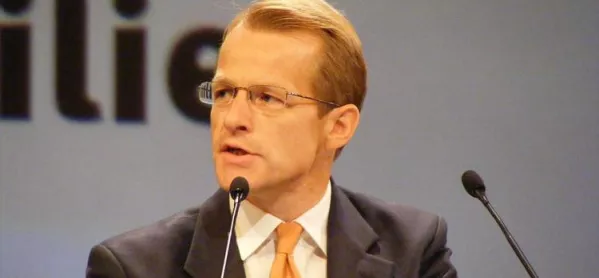The government’s policy of giving working parents 30-hours free childcare but denying it to disadvantaged parents who are unemployed is “utterly nuts”, David Laws has said.
The former Liberal Democrat schools minister, who now chairs the Education Policy Institute, branded the offer a “negative early years’ premium” benefiting wealthy parents, and said that when the policy was proposed by the Conservatives while the Coalition government was in power, it prompted his only threat to resign from government unless it was dropped.
Under the new entitlement, which came into effect last month, working parents of 3- and 4-year-olds with an annual household income of up to £199,998 are eligible for 30-hours free childcare per week during term time, so long as neither parent earns over £100,000.
However, families where one or both parents are not in work are not usually eligible for the entitlement and have to make do with 15-hours free childcare.
Speaking at the Schools Northeast Summit in Newcastle today, Mr Laws said the current policy penalised children from poorer backgrounds.
“I think it’s utterly nuts to have.. an early years offer where the children of two investment bankers can get a 30-hour provision and the children from very disadvantaged backgrounds get 15,” he said. “It’s essentially a ‘negative early years premium’.”
Mr Laws said the Lib Dems fought “unbelievably hard” during the Coalition to persuade the Conservatives to adopt an early years pupil premium worth £50 million a year. However, he said the Tories then tried to insert an extended childcare for working parents into the March 2015 Budget, which would have involved spending “12 times that amount on an intervention which was designed entirely for political purposes, as a childcare offer essentially to pre-empt something that had been offered by the Labour Party”.
He said the Conservatives’ proposal was “the only thing in government that made me threaten resignation if it went ahead”. The threat resulted in the offer being “whipped out” of the draft Budget, he said.
“Unfortunately [the Lib Dems] then didn’t do very well in the general election and it came straight back in,” he added.
Mr Laws said the government needed to concentrate more on early years education because 40 per cent of the attainment gap between poor and wealthy pupils at the end of secondary school emerges before children enter the school system.
In particular, he suggested that the government should divert some of the money it is giving to universities to early years.
“It’s ironic that all of the debate in Westminster and the big announcement at the Conservative Party conference recently was all about subsiding higher education more - we spend a truckload of money as a country on HE.”
“On the other hand we have an early years system which compared with other countries is underfunded, which pays its staff significantly less than other developed countries and as a consequence has a much lower qualified staff.”
Mr Laws added that previous early years reforms had mainly focused on “improving access to childcare, with a back to work agenda, rather than improving the quality of early years education”.




